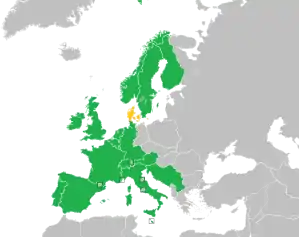Eurovision Song Contest 1972
The Eurovision Song Contest 1972 was the 17th edition of the annual Eurovision Song Contest. It took place in Edinburgh, Scotland, United Kingdom, and was held at the Usher Hall on Saturday 25 March 1972. The show was hosted by Moira Shearer.
| Eurovision Song Contest 1972 | |
|---|---|
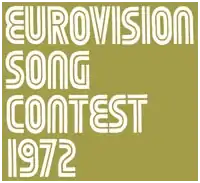 | |
| Dates | |
| Grand final | 25 March 1972 |
| Host | |
| Venue | Usher Hall Edinburgh, Scotland, United Kingdom |
| Presenter(s) | Moira Shearer |
| Musical director | Malcolm Lockyer |
| Directed by | Terry Hughes |
| Executive supervisor | Clifford Brown |
| Executive producer | Bill Cotton |
| Host broadcaster | British Broadcasting Corporation (BBC) |
| Interval act | Military Tattoo at Edinburgh Castle |
| Website | eurovision |
| Participants | |
| Number of entries | 18 |
| Debuting countries | None |
| Returning countries | None |
| Non-returning countries | None |
Participation map
| |
| Vote | |
| Voting system | Two-member juries (one aged 16 to 25 and the other 25 to 55) rated songs between one and five points. |
| Nul points | None |
| Winning song | "Après toi" |
Following Séverine's win for Monaco at the 1971 contest in Dublin, Ireland with the song "Un banc, un arbre, une rue", the principality were unable to meet the demands of hosting the event. Rainier III of Monaco received a letter from the European Broadcasting Union about hosting the 1972 contest in the principality, but he was unable to provide a venue, the props and the remainder of the requirements. The BBC stepped in, and chose to stage the contest in Edinburgh. This was the fourth time the UK played host, after the 1960, 1963, and 1968 editions, however, this is the first (and, so far, only) time that the UK hosted the contest in a venue outside England.
The winner was Luxembourg with the song "Après toi", performed by Vicky Leandros, written by Klaus Munro and Yvess Dessca, and composed by Munro and Mario Panas. Munro also conducted the song at the contest. This was Luxembourg's third victory in the contest, following their wins in 1961, and 1965. Yves Dessca also wrote for "Un Banc, Un Arbre, Une Rue" that won the previous edition, and other than conductors of the winning song, became the second person to win the Contest twice, the first person to win for two different countries and the first person to win two years in a row.[1] Germany finished in third place for the third consecutive year, equalling their highest placement from the previous two editions.
Séverine made the trip to Edinburgh to pass on the 'Grand Prix' to Vicky Leandros. However, she looked thoroughly uninterested in the Monegasque entry when seen by viewers checking her watch before the song was performed.[1]
Location
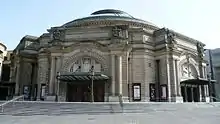
The 1972 Eurovision Song Contest was hosted by Edinburgh, the capital city of Scotland. The Usher Hall, the venue for the 1972 contest, is a concert hall, situated on Lothian Road, in the west end of Edinburgh, Scotland. It has hosted concerts and events since its construction in 1914 and can hold approximately 2,900[2] people in its recently restored auditorium, which is well loved by performers due to its acoustics. The Hall is flanked by The Royal Lyceum Theatre on the right and The Traverse Theatre on the left. Historic Scotland has registered the Hall with Category A listed building status.
Format
The stage design included a screen to introduce and accompany the on stage competing performances, and to show an interval act and voting sequence that were done at Edinburgh Castle. Before each country's performance, a picture of each song's performers along with their names and the song's title were projected on the screen, and during each performance, animated spiral shapes were projected as additional visual effect. The interval act was performed at the outside vast Esplanade of the Great Hall of Edinburgh Castle. The jurors were stationed in the safety of the castle, and watched the competing performances at Usher Hall on TV.
Each country had two jury members, one aged between 16 and 25 and one aged between 26 and 55. They each awarded 1 to 5 points for each song, other than the song of their own country. They cast their votes immediately after each song was performed and the votes were then collected and counted. For the public voting sequence after the interval act, the jury members were shown on the stage's screen with each lifting a signboard with the number between 1 and 5 for each song, as a visual verification of the scores they had awarded earlier. The eventual winner, Luxembourg, remained in a strong scoring position throughout the voting.
1972 was the first year that had no ties in the voting. Every year prior to 1972, at least two countries had received the same score.
Participating countries
All countries that participated in the 1971 contest were present this year.
Conductors
Each performance had a musical director who conducted the orchestra.[3][4]
 Germany – Paul Kuhn
Germany – Paul Kuhn France – Franck Pourcel
France – Franck Pourcel Ireland – Colman Pearce
Ireland – Colman Pearce.svg.png.webp) Spain – Augusto Algueró
Spain – Augusto Algueró United Kingdom – David Mackay
United Kingdom – David Mackay Norway – Carsten Klouman
Norway – Carsten Klouman Portugal – Richard Hill
Portugal – Richard Hill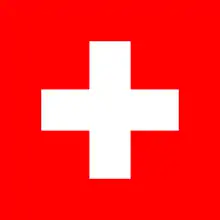 Switzerland – Jean-Pierre Festi
Switzerland – Jean-Pierre Festi Malta – Charles Camilleri
Malta – Charles Camilleri Finland – Ossi Runne
Finland – Ossi Runne Austria – Erich Kleinschuster
Austria – Erich Kleinschuster Italy – Gian Franco Reverberi
Italy – Gian Franco Reverberi.svg.png.webp) Yugoslavia – Nikica Kalogjera
Yugoslavia – Nikica Kalogjera Sweden – Mats Olsson
Sweden – Mats Olsson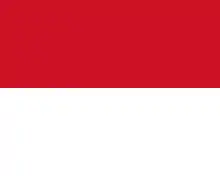 Monaco – Raymond Bernard
Monaco – Raymond Bernard.svg.png.webp) Belgium – Henri Segers
Belgium – Henri Segers Luxembourg – Klaus Munro
Luxembourg – Klaus Munro Netherlands – Harry van Hoof
Netherlands – Harry van Hoof
Returning artists
Four artists returned to the competition this year. Luxembourg's Vicky Leandros who last performed for the nation in 1967; Carlos Mendes for Portugal who last participated in 1968; Swedish entry Family Four who returned for a second consecutive year; and Yugoslavia's Tereza Kesovija who previously represented Monaco in 1966.
Results
Scoreboard
| Results | |||||||||||||||||||||
|---|---|---|---|---|---|---|---|---|---|---|---|---|---|---|---|---|---|---|---|---|---|
| Germany | 107 | 8 | 6 | 9 | 5 | 6 | 6 | 5 | 4 | 5 | 5 | 7 | 5 | 8 | 8 | 7 | 7 | 6 | |||
| France | 81 | 5 | 5 | 2 | 9 | 7 | 2 | 3 | 5 | 4 | 2 | 3 | 5 | 2 | 6 | 7 | 8 | 6 | |||
| Ireland | 72 | 4 | 3 | 4 | 4 | 6 | 4 | 3 | 6 | 3 | 4 | 3 | 3 | 5 | 5 | 4 | 6 | 5 | |||
| Spain | 83 | 7 | 5 | 5 | 3 | 8 | 6 | 3 | 4 | 4 | 5 | 3 | 2 | 7 | 8 | 3 | 5 | 5 | |||
| United Kingdom | 114 | 8 | 9 | 6 | 2 | 10 | 4 | 8 | 2 | 7 | 7 | 7 | 9 | 6 | 9 | 4 | 8 | 8 | |||
| Norway | 73 | 4 | 3 | 6 | 5 | 4 | 5 | 2 | 5 | 7 | 3 | 2 | 5 | 4 | 4 | 4 | 6 | 4 | |||
| Portugal | 90 | 3 | 4 | 7 | 7 | 4 | 2 | 6 | 5 | 2 | 4 | 9 | 4 | 7 | 4 | 7 | 10 | 5 | |||
| Switzerland | 88 | 4 | 5 | 6 | 5 | 4 | 7 | 2 | 4 | 7 | 8 | 5 | 5 | 4 | 6 | 4 | 7 | 5 | |||
| Malta | 48 | 3 | 2 | 4 | 2 | 6 | 2 | 2 | 2 | 5 | 2 | 2 | 2 | 3 | 3 | 2 | 2 | 4 | |||
| Finland | 78 | 4 | 3 | 3 | 6 | 5 | 6 | 4 | 3 | 3 | 3 | 3 | 4 | 4 | 5 | 8 | 6 | 8 | |||
| Austria | 100 | 6 | 6 | 6 | 6 | 3 | 5 | 5 | 7 | 5 | 4 | 6 | 8 | 10 | 5 | 4 | 5 | 9 | |||
| Italy | 92 | 4 | 5 | 3 | 2 | 3 | 6 | 7 | 9 | 6 | 6 | 6 | 4 | 8 | 6 | 6 | 6 | 5 | |||
| Yugoslavia | 87 | 7 | 4 | 5 | 8 | 5 | 4 | 5 | 2 | 4 | 3 | 3 | 2 | 4 | 9 | 8 | 8 | 6 | |||
| Sweden | 75 | 5 | 3 | 5 | 3 | 3 | 5 | 4 | 2 | 4 | 5 | 4 | 3 | 7 | 5 | 7 | 5 | 5 | |||
| Monaco | 65 | 4 | 3 | 4 | 3 | 5 | 6 | 2 | 2 | 5 | 5 | 3 | 3 | 4 | 3 | 4 | 4 | 5 | |||
| Belgium | 55 | 2 | 3 | 4 | 2 | 5 | 2 | 3 | 3 | 5 | 4 | 2 | 3 | 2 | 2 | 4 | 6 | 3 | |||
| Luxembourg | 128 | 9 | 8 | 9 | 2 | 10 | 8 | 7 | 6 | 4 | 6 | 8 | 9 | 10 | 8 | 7 | 8 | 9 | |||
| Netherlands | 106 | 6 | 6 | 8 | 8 | 9 | 8 | 5 | 6 | 3 | 9 | 6 | 3 | 9 | 6 | 5 | 2 | 7 | |||
10 points
Below is a summary of all perfect 10 scores that were given during the voting.
| N. | Contestant | Voting nation |
|---|---|---|
| 2 | Luxembourg | United Kingdom, Yugoslavia |
| 1 | Austria | Sweden |
| Portugal | Luxembourg | |
| United Kingdom | Norway |
Broadcasters, commentators and jury members
Jury members
Listed below is the order in which votes were cast during the 1972 contest along with the names of the two jury members who voted for their respective country. Each country announced their results in groups of three.
 Germany – Unknown
Germany – Unknown France – Unknown
France – Unknown Ireland – Unknown
Ireland – Unknown.svg.png.webp) Spain – Emma Cohen and Luis María Ansón[7]
Spain – Emma Cohen and Luis María Ansón[7] United Kingdom – Doreen Samuels and Robert Walker[4][8][9]
United Kingdom – Doreen Samuels and Robert Walker[4][8][9] Norway – Rachel Nord and Signe Abusdal[10]
Norway – Rachel Nord and Signe Abusdal[10] Portugal – Pedro Sousa Macedo and Maria João Aguiar[11]
Portugal – Pedro Sousa Macedo and Maria João Aguiar[11] Switzerland – Unknown
Switzerland – Unknown Malta – Mary Rose Mallia and Joe Zerafa[12]
Malta – Mary Rose Mallia and Joe Zerafa[12] Finland – Merita Merikoski and Åke Granholm[13]
Finland – Merita Merikoski and Åke Granholm[13] Austria – Unknown
Austria – Unknown Italy – Unknown
Italy – Unknown.svg.png.webp) Yugoslavia – Vera Zlokovic and Veljko Bakasun[14]
Yugoslavia – Vera Zlokovic and Veljko Bakasun[14] Sweden – Titti Sjöblom and Arne Domnérus[15]
Sweden – Titti Sjöblom and Arne Domnérus[15] Monaco – Unknown
Monaco – Unknown.svg.png.webp) Belgium – Unknown
Belgium – Unknown Luxembourg – Unknown
Luxembourg – Unknown Netherlands – Jennifer Baljet and Cornelis Wagter
Netherlands – Jennifer Baljet and Cornelis Wagter
Broadcasters and commentators
Each national broadcaster also sent a commentator to the contest, in order to provide coverage of the contest in their own native language.
| Country | Broadcaster(s) | Commentator(s) | Ref(s) | |
|---|---|---|---|---|
| Participating countries | ||||
| FS1 | Ernst Grissemann | [16] | ||
| Hitradio Ö3 | Hubert Gaisbauer | |||
| RTB | French: Arlette Vincent | [16] | ||
| BRT | Dutch: Herman Verelst | [16] | ||
| RTB La Première | French: André Hagon | |||
| BRT Radio 1 | Dutch: Nand Baert | |||
| YLE TV1 | Heikki Seppälä | [16] | ||
| Yleisohjelma | Matti Paalosmaa | |||
| Deuxième Chaîne ORTF | Pierre Tchernia | [16][17] | ||
| Deutsches Fernsehen | Frank Elstner | [16] | ||
| Deutschlandfunk/Bayern 2 | Wolf Mittler | |||
| RTÉ | Frank Hall | [16] | ||
| RTÉ Radio | Kevin Roche | |||
| Programma Nazionale and Secondo Programma Radio |
Renato Tagliani | |||
| Télé-Luxembourg | Jacques Navadic | |||
| RTL | Camillo Felgen | |||
| MTV | Norman Hamilton | [18] | ||
| Télé Monte Carlo and Radio Monte-Carlo |
José Sacré | |||
| Nederland 1 | Pim Jacobs | [16][19] | ||
| NRK | Roald Øyen | [16] | ||
| NRK P1 | Erik Heyerdahl | |||
| I Programa | Henrique Mendes | [16] | ||
| Emissora Nacional Programa 1 | Amadeu Meireles | |||
| Primera Cadena | Julio Rico | [16] | ||
| Primer Programa RNE | Miguel de los Santos | |||
| SR TV1 | Bo Billtén | [15] | ||
| SR P3 | Björn Bjelfvenstam | [15] | ||
| TV DRS | German: Theodor Haller | [20] | ||
| TSR | French: Georges Hardy | [21] | ||
| TSI | Italian: Giovanni Bertini | |||
| 2e Programme | French: Robert Burnier | [22] | ||
| BBC1 | Tom Fleming | [4][16] | ||
| BBC Radio 2 | Pete Murray | [4] | ||
| BFBS Radio | Terry James | [4] | ||
| TVB 1 | Serbo-Croatian: Milovan Ilić | |||
| TVZ 1 | Serbo-Croatian: Oliver Mlakar | |||
| TVL 1 | Slovene: Tomaž Terček | |||
| Non-participating countries | ||||
| Rede Tupi | Unknown | |||
| EIRT | Mako Georgiadou | |||
| TBC | Unknown | [23] | ||
| Sjónvarpið | Björn Matthíasson | |||
| Israeli Television | No commentator | |||
| TBC | Unknown | [23] | ||
| ABS-CBN | No commentator | [23] | ||
| TBC | Unknown | [23] | ||
| TBC | Unknown | [23] | ||
References
- O'Connor, John Kennedy. The Eurovision Song Contest – The Official History. Carlton Books, UK. 2007 ISBN 978-1-84442-994-3
- "Geograph:: The Usher Hall, Edinburgh (C) Kevin Rae". www.geograph.org.uk.
- "And the conductor is..." Retrieved 26 July 2020.
- Roxburgh, Gordon (2014). Songs for Europe: The United Kingdom at the Eurovision Song Contest. Volume Two: The 1970s. Prestatyn: Telos Publishing. pp. 76–98. ISBN 978-1-84583-093-9.
- "Eurovision Song Contest 1972". The Diggiloo Thrush. Retrieved 4 March 2012.
- "Eurovision Song Contest 1972". 4Lyrics.eu. Retrieved 16 September 2020.
- Eurojaume dice (15 February 2008). "Eurovisión 1972 – Programa posterior al festival | AEV ESPAÑA". Aeveurovision.com. Archived from the original on 16 March 2012. Retrieved 10 August 2012.
- "Dubliner Jury bestochen?", Hamburger Abendblatt, 6 April 1971
- "Eurovision 1972". Songs4europe.com. 25 March 1972. Archived from the original on 22 March 2012. Retrieved 10 August 2012.
- http://www.nrk.no/debatt/index.phpshowtopic=87458&pid=1343226&mode=threaded&start=. Retrieved 21 May 2011. Missing or empty
|title=(help) - Vasco Hogan Teves, 1964–1983 20 anos de Festival RTP da Canção
- "Views and comments on the Eurovision Song Contest", Times of Malta, 29 March 1972
- "Muistathan: Eurovision laulukilpailu 1972". Viisukuppila.fi. 9 January 2012. Retrieved 10 August 2012.
- Vladimir Pinzovski
- Thorsson, Leif (2006). Melodifestivalen genom tiderna ["Melodifestivalen through time"]. Stockholm: Premium Publishing AB. p. 94. ISBN 91-89136-29-2.
- "Eurovision 1972 - Cast and Crew". IMDb. Retrieved 26 July 2020.
- Christian Masson. "1972 – Édimbourg". Songcontest.free.fr. Retrieved 10 August 2012.
- "Eurovision Song Contest 1972", Times of Malta, 25 March 1972
- "Nederlandse televisiecommentatoren bij het Eurovisie Songfestival" (in Dutch). Eurovision Artists. Retrieved 1 June 2010.
- "Au Grand Prix Eurovision de la Chanson". Radio TV - Je vois tout. Lausanne, Switzerland: Le Radio SA. 23 March 1972.
- "Au Grand Prix Eurovision de la Chanson". Radio TV - Je vois tout. Lausanne, Switzerland: Le Radio SA. 23 March 1972.
- "Au Grand Prix Eurovision de la Chanson". Radio TV - Je vois tout. Lausanne, Switzerland: Le Radio SA. 23 March 1972.
- "Eurovision Song Contest: Edinburgh 1972". eurovision.tv. Retrieved 13 August 2020.
External links
| Wikimedia Commons has media related to Eurovision Song Contest 1972. |
